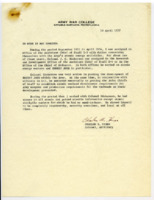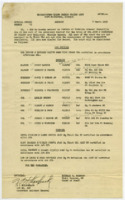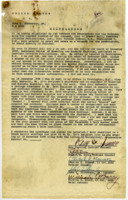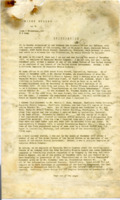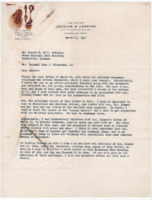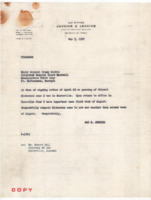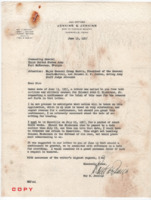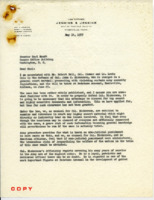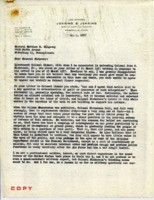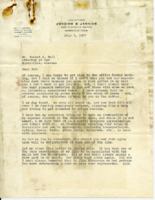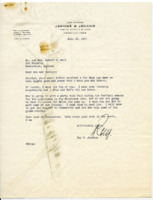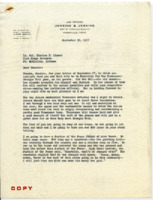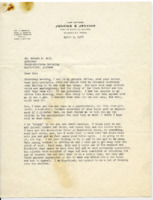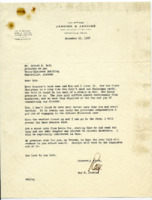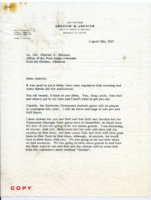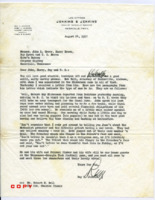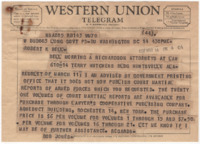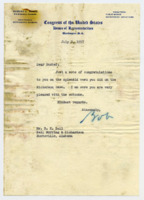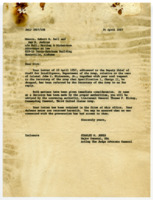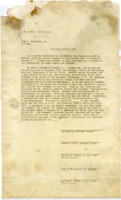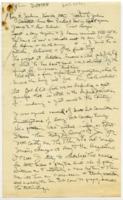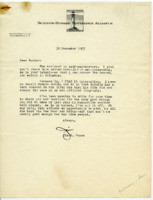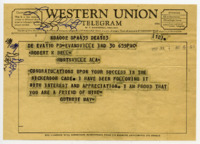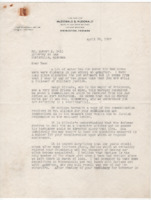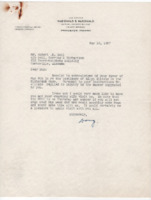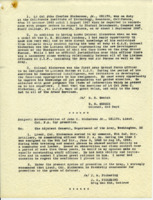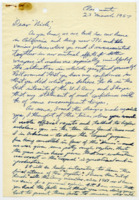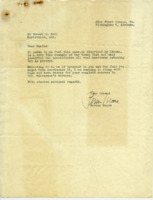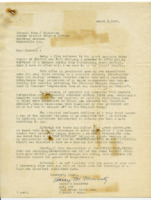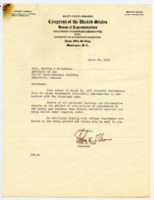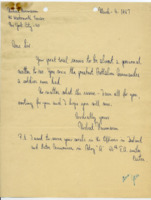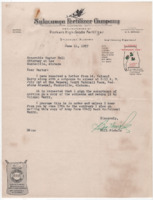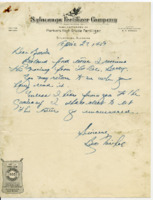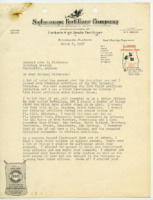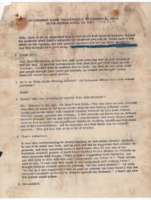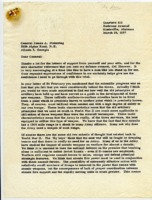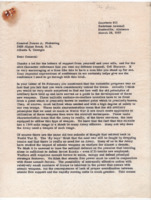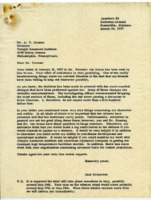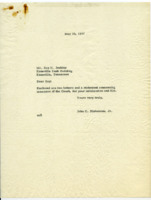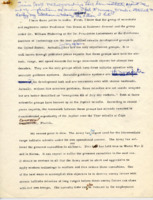
Browse Items (215 total)
Sort by:
-
Letter from Col. Charles B. Hines.
This letter is written to testify of Colonel John C. Nickerson, Jr.'s character. Hines writes that Nickerson showed himself to be "completely trustworth, security conscious, and loyal at all times." -
Special Orders Number 43.
The order calls to convene a General Court-Martial at Redstone Arsenal in Huntsville, Alabama for the trial of Colonel John C. Nickerson, Jr. of the Army Ballistic Missle Agency. The document lists the names of the members of the members and counsel. -
Stipulation of the testimony of Edward Hull.
Written testimony of Edward Hull, assistant editor of Missiles and Rockets Magazine, as presented if he were "present in court". Signed by the defense counsel, the accused, and the trial counsel. -
Stipulation of the testimony of William F. Hunt.
Written testimony of William F. Hunt, employee of Reynolds Metals Company, as presented if he were "present in court". No signatures of the defense counsel, accused, or trial counsel are on the document. -
Letter to Robert K. Bell from Ray H. Jenkins.
Jenkins writes in response to Bell's March 22 letter, addressing the various information that was included in Bell's letter and his ability to visit Huntsville for nine days to help prepare for the trial. -
Telegram to Major General Crump Garrin from Ray H. Jenkins.
Jenkins requests the trial of Colonel Nickerson to be scheduled no earlier than the second week of August due to an important case he has the first week of August. -
Letter to the Commanding General, Third United States Army, from Ray H. Jenkins.
Jenkins writes to Major General Crump Gavin citing his personal reasons why the Commanding General should approve the defense counsel's request for a continuance. -
Letters to senators in Washington D.C. from Ray Jenkins.
Ray Jenkins sends the same letter to various senators in Washington D.C. in an effort to speed up the approval of top secret clearance for the defense counsel and advocate for non-judicial punishment for Colonel Nickerson rather than court-martial. He summarizes Nickerson's efficiency reports as well. Jenkins concludes by asking if the senator would convey the message and thinking of the defense counsel to the Secretary of Defense, Mr. Wilson. -
Letter to General Matthew B. Ridgeway from Ray H. Jenkins.
Jenkins writes to Ridgeway in response to his letter to Charles Zimmer that his testimony would not be relevant and admissible in the case of Colonel Nickerson. Jenkins details in his letter why Ridgeway should reconsider and awaits his reply with interest. -
Letter to Robert K. Bell from Ray H. Jenkins.
Jenkins writes after the trial of Colonel Nickerson, stating that he is completely relaxed and trying to get back into office routine. He approximates the expenses in the Nickerson case and says that his fee would be satisfactory as the amount agreed upon by Nickerson and Bell. He concludes by stating that Nickerson came out of the trial "unscathed and unscarred" and sends his best to Bell and his wife. The Nickerson trial ended with the dropping of the Espionage Act and perjury charges in exchange for 15 minor counts of mishandling defense information. Nickerson was fined $1,500, reprimanded, and forbidden to exercise his command for a year. He was later sent to a military base in Panama and died in a car crash a few years later. -
Letter to Robert K. Bell and his wife, Carolyn, from Ray H. Jenkins.
This letter addressed to both Robert and his wife details personal correspondence about various daily activities of Jenkins' life. -
Letter to Lt. Col. Charles R. Zimmer from Ray H. Jenkins.
Jenkins writes in reponse to Zimmer's letter of September 27, 1957 about Zimmer's upcoming visit to Knoxville for the Georgia Tech game. Jenkins writes that Bell has also accepted the invitation and will be there as well. This copy of the letter includes a message for Robert K. Bell as it was forwarded to him as well. Jenkins writes about a mutual friend, Kenneth Nugent, who called after the game. Jenkins tells Bell to thank Kenneth for the call and that he is sorry to have missed him. -
Letter to Robert K. Bell from Ray H. Jenkins.
Jenkins writes to Bell in response to a previous letter. They frequently exchange humorous stories through correspondence and Jenkins states that he will tell another when they meet in person again. Jenkins also expresses longing to get together with the entire defense counsel and their families and looks forward to doing so. -
Letter to Robert K. Bell from Ray H. Jenkins.
Jenkins writes to Bell about Drew Pearson's book, U.S.A.--Second-Class Power?, of which, he mentions, has an entire chapter on Colonel Nickerson. -
Letter to Lt. Col. Charles R. Zimmer from Ray H. Jenkins.
Jenkins writes to invite Zimmer to the Tennessee-Georgia Tech game in Knoxville along with Robert K. Bell and his wife. -
Letter to John L. Greer, Harry Brown, Roy Brown, and T. G. Brown.
Jenkins writes to the Browns to inform them that Robert K. Bell and his wife will be in Knoxville for the Tennessee-Georgia Tech football game and states that they must come meet the Bells. Jenkins includes two paragraphs from a previous letter from Bell to demonstrate his personality. -
Telegram to Robert K. Bell from Bob Jones.
Jones sent this telegram in reponse to Bell's March 11th letter requesting information for the Nickerson case. He informs Bell that the information cannot be sent to him but may be purchased in a 15 volume book set. -
Letter to Robert K. Bell from Robert E. Jones.
Bob Jones writes to Bell to congratulate him on the "splendid work" he did on the Nickerson case. -
Letter and draft of letter to Robert K. Bell and Ray H. Jenkins from Stanely W. Jones.
Jones writes to Bell and Jenkins in response to their letter of April 13, 1957 to the Deputy Chief of Staff for Intelligence, Department of the Army. With an oral request, the defense counsel had requested for the drop of Specification 1, Charge II. Jones states that as soon as a decision is made the convening authority will advise them of it. -
Stipulation of the testimony of Brigadier General A. J. Kinney.
Written testimony of Brigadier General A. J. Kinney, Director of the Office of information Services, Department of the Air Force, as presented if he were "present in court". No signatures of the defense counsel, accused, or trial counsel are on the document. -
Handwritten letter to Ray H. Jenkins from Jim G. Lucas.
Lucas writes that after spending a day with the trial lawyer, he has become convinced that Colonel Nickerson is a valuable asset to the nation's defense and to the Army. Lucas continues to provide information he knows relevant to the case. -
Letter to Robert K. Bell from Jim G. Lucas.
Lucas writes concerning an enclosed document and thoughts regarding Colonel Medaris and the Nickerson case that had closed earlier that year. He closes by thanking Bell and his wife for their hospitality during his last stay in Huntsville. -
Telegram to Robert K. Bell from Guthrie May.
May wires Bell to congratulate him on the success of the Nickerson case and states that he is proud to be Bell's friend. -
Letter to Robert K. Bell from Douglas H. McDonald.
McDonald expresses interest in John C. Nickerson's case to Bell in this letter. He explains that he heard about the case from a friend, Ralph Wiltsie, who served under Colonel Nickerson during World War II. McDonald writes that Wiltsie is under the impression that the counsel will want to call him as a trial witness. -
Letter from Douglas H. McDonald to Robert K. Bell.
In response to Bell's May 8th letter, McDonald informs Bell that Mr. Wiltsie will proceed as instructed regarding the reponse to the inquiry. He also expresses that he and his wife are excited to have Bell and his wife visit them. -
Reports on Colonel John C. Nickerson, Jr.
These three reports on Nickerson by various military officers testify to his character and military service. -
Handwritten letter to Colonel John C. Nickerson, Jr. from Ben Messick.
Messick writes to encourage Nickerson in his case, stating that he is confident Nickerson did what he believed to be in the best interest of the Army. -
Letter to Robert K. Bell from Person Moore.
Moore sends another case to Bell hoping it will be of interest to him in the Nickerson case. -
Letter to Colonel John C. Nickerson, Jr. from Harry M. Moriarty.
Moriarty offers his services as a witness during Nickerson's trial and why what he has to offer would be to their "mutual benefit." He encloses with the letter an outline of a complaint that may be beneficial to Nickerson's case as well as his own. -
Letter to the defense counsel from John E. Moss.
Moss writes in response to the defense counsel's request of March 25, 1957 for information from the House Government Information Subcommittee. Moss states that all published hearings and reports on the subject are being mailed separately. -
Handwritten letter to Colonel John C. Nickerson, Jr. from Norbert Neumann.
Neumann calls Nickerson case a "personal matter" and writes that he is rooting for him and that he was the greatest Battalion Commander he had ever had. -
Letter to Robert K. Bell from William Nichols.
Nichols writes to Bell to inform him of the supoena he received to appear in court on July 2nd. He states that he will proceed as requested unless he hears from Bell with other instructions. -
Handwritten letter to Robert K. Bell.
Nichols writes regarding a letter he received from Lt. Col. Barry that may be of some interest to Bell and the Nickerson case. -
Letter to Colonel John C. Nickerson, Jr. from William F. Nichols.
Nichols writes to Nickerson, reminiscing of their time in active duty together in various places and how he held Nickerson in "highest esteem." He expresses concern over charges that indicate espionage, stating that they are "without foundation." He offers to appear in Nickerson's behalf and recommends reaching out to Brigadier General Pickering as well. -
Statements of Mrs. Nickerson and Dr. Wernher von Braun.
These voluntary statements were made in the office of Robert K. Bell. The first by Mrs. John C. Nickerson and the second by Dr. Wernher von Braun. -
Letter from Col. John C. Nickerson at Redstone Arsenal in Huntsville, Alabama, to Gen. James A. Pickering in Atlanta, Georgia.
In this letter, Nickerson thanks Gen. Pickering for his support and explains why he believes the Army is the best service branch to develop ballistic missiles. He also discusses the need for missiles in case of war with the Soviet Union. Nickerson was a staff officer at the Army Ballistic Missile Agency at Redstone Arsenal assigned to work on the Jupiter, the United States' first mid-range ballistic missile. He was arrested and court martialed for espionage in 1957 after releasing sensitive documents about the United States missile program to the press. At the time, Secretary of Defense Charles E. Wilson granted the Air Force sole authority to develop intermediate range ballistic missile systems. Nickerson disagreed with this policy, and in response, leaked documents that demonstrated the superiority of Army missiles compared to those developed by the Air Force. He eventually pled guilty to lesser charges and was suspended from the Army for one year and was fined $1,500. Dr. Wernher von Braun was among those who testified on Nickerson's behalf. -
Letter to James A. Pickering from John "Jack" Nickerson.
Nickerson thanks Pickering for the letters of support sent to his defense counsel. He also discusses ballistic surface-to-surface missiles and "scientific progress". He ends by requesting a deposition as Pickering will be in Europe in May, when the trial is scheduled to happen. -
Letter to Dr. A. V. Grosse from Colonel John C. Nickerson, Jr.
In response to Grosse's letter to Dr. Wernher von Braun that had been sent to him, Nickerson thanks him for his offer of assistance in the case and asks if he would consent to appearing as a witness. -
Letter to Ray H. Jenkins from Colonel John C. Nickerson, Jr.
This letter states that Nickerson sent two letters and a statement concerning member of the Court. However, this is the only letter in the collection. -
Colonel John C. Nickerson, Jr. clarification of actions took.
To clarify his intentions of the actions he took that led him to be court-martial, John C. Nickerson, Jr. writes a detailed document outlining three points. This set of documents includes two drafts of his message.
